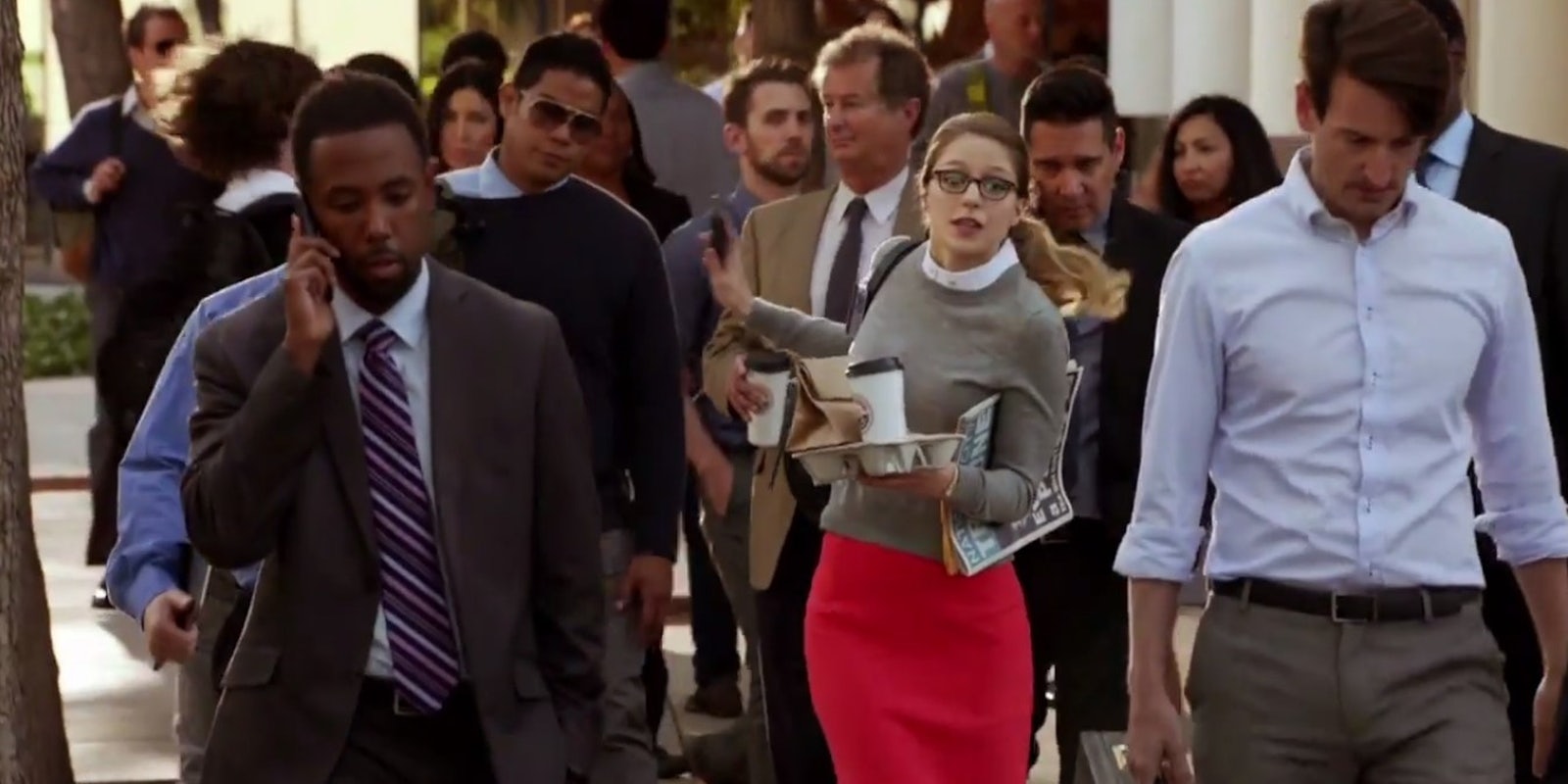Heroes need struggles: Batman grieves, Iron Man drinks, and Black Widow tries to atone for sins past. In this respect, Superman has always challenged screenwriters. The least successful adaptations in recent decades—Smallville and Man of Steel—have been those which struggled to give him a clear arc, whereas the best (Lois and Clark and Superman Returns) have studied his vulnerabilities. The way to write an alien immortal, it would seem, is with human anxieties—about relationships, failing to save everyone, or how the world Kal-El suffers for no longer wants him.
How should TV approach his younger cousin, then?
The first trailer for this year’s CBS-made Supergirl acquired fans and detractors alike at lightning speed. I’m one of the former. At Digg and io9 as well as on social networks, the clip was disparagingly compared to Saturday Night Live‘s Black Widow spoof trailer, in which Natasha Romanoff moves to the city, breaks her heel en route to work at a fashion mag, and struggles with dating.
It’s true that Supergirl seems set to couple chick flick tropes with planet-saving sci-fi—as if The Devil Wears Prada and Can Fly isn’t a show you’d watch—but I don’t think that’s to its detriment. In fact, I think it’s a smart approach to the character.
SNL‘s point wasn’t that no female hero should date, eat ice cream, or like clothes—it was that studio heads should know better often default to lazy characterizations of women and tired formulas of “what female viewers want.” Two of Supergirl‘s executive producers, Greg Berlanti and Andrew Kreisberg, are also behind the CW’s Arrow, which has already featured a number of diverse female heroes, from Nyssa al-Ghul to Thea Queen; none of them resemble Supergirl’s Kara Zor-El.
Thus, it would be unfair to say that Berlanti and Kriesberg didn’t know what else to write.
SNL‘s point wasn’t that no female hero should date, eat ice cream, or like clothes.
In fact, there’s always been a layer of winking pastiche to Greg Berlanti’s shows, whether in Ray Palmer’s nods to Iron Man or Mark Hamill’s Darth Vader moment in The Flash. What has made both shows such a refreshing part of TV’s comic book revolution is their humor and self-consciousness, instead of the gritty seriousness that dominated Fox’s Gotham and NBC’s ill-fated Constantine.
The Flash debuted with a 96 percent on Rotten Tomatoes, with reviewers crediting how well the show follows Arrow’s template. TV Guide‘s Matt Roush called the show “one of the most enjoyable, agreeable and infectiously exuberant new shows of the fall, a welcome respite from the angst-heavy gloom that burdens so many comics-inspired superhero action shows these days.”
Thus, when Supergirl plays up the rom-com shtick, it’s a safe bet its characters will be in on the joke. Even the trailer hints at a meta take on its own genre-bending. When Kara asks her boss (played by Calista Flockhart) why she has to be called “Supergirl” instead of “Superwoman,” Flockhart’s character retorts: “What do you think is so bad about ‘girl’? I’m a girl, and your boss, and powerful, and rich, and hot, and smart. So if you perceive Supergirl as anything less than excellent, isn’t the real problem you?”
That tone makes total sense for the character. Unlike Natasha Romanoff (whose Age of Ultron plot wasn’t a feminist favorite either), Kara Danvers isn’t a thirtysomething assassin with world-class training and a dark history. She’s an ordinary twenty-four year old American girl—who just happens to be a super-powered alien. In contrast to the older Superman, whose shoulders carry the weight of the world, it makes sense for her battles to be personal rather than philosophical.
Supergirl’s struggles—finding herself, fumbling through dating for the first time, being underestimated and overlooked at work, and emerging from the shadow of past generations—are the struggles of every young person (including Spider-Man, for that matter); they’re just magnified on an intergalactic scale. Chick flicks often portray these trials, while Smallville, hooked on its grandiose mythos, never managed to do the same for young Kal-El.
When Supergirl plays up the rom-com shtick, it’s a safe bet its characters will be in on the joke.
The Ugly Betty cliché of a “frumpy” (read: still pretty) girl at her big-time publishing job is, yes, absurdly unrealistic. The truth, as io9’s Meredith Woerner observes, is that no coffee-fetching assistant could afford Melissa Benoist’s apartment in the trailer and that even such a small job at a workplace like hers would be miles out of reach for 99 percent of today’s college graduates.
Nonetheless, the series could speak to millennials the way Buffy the Vampire Slayer spoke to teenagers 15 years ago. Traditionally, Clark Kent is the everyman of the American dream, assuring us that even the most bumbling, mild-mannered reporter can be a man of steel. In Berlanti’s series, meanwhile, even godlike abilities seem insufficient to save Kara from being a wandering twentysomething—though her promise of tights, flights, and blue skies offer hope.
I buy it, and fellow nerds my age should, too. After so many men of tomorrow, maybe it’s time for the girl of today.
Alex Gabriel is the author of Godlessness in Theory, a blog about atheism, queer politics and pop culture. He writes elsewhere about geekery and current events. Follow him on Twitter at @AlexGabriel.
Screengrab via YouTube/CBS


